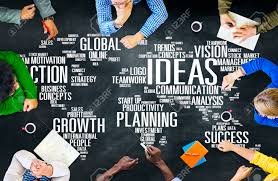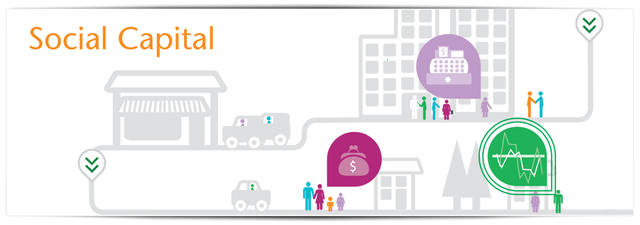Human Capital, Social & Relationship Capital and Intellectual Capital - 2 of 3 in a series of posts on the Six Capitals
As promised earlier, this is the second of three "sub-posts" outlining the Six Capitals, a way of articulating value beyond basic financial terms, in support of forward-looking corporate governance. Ultimately, the Capitals provide an accessible way of articulating how companies are creating sustainable value. Sustainable value is about taking a holistic view on people, planet and profits. I'm also doing this to kickstart a discussion on how Steem and the Steemit community can influence this new(ish) approach to corporate governance.
I’m posting about these three Capitals, Human Capital, Social and Relationship Capital and Intellectual Capital, together because I’ve found people often conflate and confuse them.
Let me start with the definitions which the International Integrated Reporting Council proposed in the Integrated Reporting Background Paper on the Capitals, and paraphrase/simplify them a bit.
Human Capital
People’s competencies, capabilities, experience and motivation to innovate, including:
- alignment with and support for an organisation’s risk management approach and ethical values, etc.
- ability to understand, develop and implement an organisation’s strategy
- loyalties and motivations for improving processes, goods and services
I’ve highlighted motivation in particular, because it doesn’t matter how smart, well-trained and obedient staff members are – if they don’t want to contribute to creating value for the organisation, they will find ways not to. Conversely, if they do, the organisation will start to see innovation, collaboration, higher performance and, dare I say, systemic solutions capability emerging, particularly if that motivation is nurtured for…long term value creation.

Social and Relationship Capital
For organisations, Social and Relationship Capital encapsulates the institutions and the relationships within and between communities, groups of stakeholders and other networks, and the ability to share information to enhance individual and collective well-being. The World Business Council on Sustainable Development (WBCSD) defines Social Capital as “the resources and relationships provided by people and society.” This definition includes human capital (people’s skills, knowledge and wellbeing), social capital (societies’ shared values, norms and institutions) and relationship capital (connections and networks).
Some expressions of Social and Relationship Capital include:
- strength of key stakeholder relationships (e.g. with employees, customers, supply chain, communities, government)
- intangibles associated with the brand and reputation that an organisation has developed
- improving the enabling environment for business
- strengthening value chains
- an organisation obtaining or maintaining its social licence to operate.
The WBCSD is driving the development of the Social Capital Protocol, which will be a "harmonised approach for businesses to measure and value their interactions with people and society”.

Source: http://www.wbcsd.org/SocialCapital.aspx
As I mentioned in my previous post on the Capitals, some thinkers have started to add Political Capital to thinking on value and the inter-related Capitals, but for the purposes of this discussion it’s well-covered under Social and Relationship Capital.
I’ll also venture to say that the governance framework an organisation chooses to use (explicitly or implicitly – there’s compliance, and there’s how we really drive strategy, after all) will largely define its Social and Relationship Capital. I invite discussion on this point!
Intellectual Capital
Comprises organisational, knowledge-based intangibles, including:
• intellectual property, including copyrights, trademarks, patents and the like
• ‘organisational capital’ such as tacit knowledge, systems, procedures and protocols (the stuff the knowledge management guys are supposed to capture).
Reporting on value creation through these three Capitals
When we look at the three of these Capitals together, it’s easy to see how they interrelate and yet how different they are. Different companies report differently on these capitals because, well, companies are different and they all create value differently. That’s why it’s important not to hold to a rigid definition of these Capitals but to focus more on how they contribute to value creation in terms of a given strategy.
….Which leads me to ask how Steem and the blockchain can ultimately contribute to a systemic improvement in how these stocks of value are assessed and articulated. Look forward to your views.
Hi, Thank you again for sharing this information! Great stuff :) Helps add a few more dimensions to the process I'm developing!!
I do have a question for deeper thought though. How do you think open-source fits into the intellectual value model?
Hi @rieki, hope it's helpful to you. My gut reaction to your question, dangerous because I haven't really applied my mind, is kind of a stream of consciousness. Open source cuts out the "middlecapital" (play on middleman) by eliminating financial capital as a means to exchange stocks of value when open source products are created. Intellectual capital isn't necessarily the same as intellectual property, so your question bears some deeper thought. Companies can choose how they apply the framework - I'm not terribly familiar with how IT companies report, but since they probably pay people to develop software there's some trade between stocks of capitals going on - Financial Capital used to motivate Human Capital to produce what I guess could be termed Manufactured Capital...not really my field. You might be poking me to think more about this.
" You might be poking me to think more about this." Excellent :)
I was interested if there was a set structure to handle that part of our transition. As we see more and more platforms being created open-source, it would be something to consider with any value system for corporations to adopt.
I for one am also open to the idea of people creating simply because they desire to! (which is how open source works). Great things are created without the need of "financial capital.. to motivate human capital". I would see systems designed that implement this desire for humans to create as well and help us to better collaborate in the process. Because, after all, it's human creativity that drives innovation NOT corporations. In fact, most ironically, real art tends to lose some of its grandeur once money gets involved. Most all of our greatest minds and innovators have done so simply off their innate desire to do so! I would like to see systems that encourage this as well.
Just my random conscious stream that came out after reading your reply... Not really sure how it applies but I like to reply unadulterated and see what happens :)
Hmmm...I now consider myself well and truly poked! Will definitely put more thought into this, particularly given that Hardfork 20 is on its way...not that HF20 has anything to do directly with open source and your question, but my synapses are telling me to look for the connection...so will apply my mind, not sure when. You've also got me thinking about individual vs corporate governance systems, under which we manage our stocks of value. I hadn't really thought about how we manage our lives in terms of personal governance systems before, but your 10 Forms of Capitals have got me thinking again about a question which often crosses my mind, which is how do we come to a common understanding and acceptance of what we all value? What is the language of value? I'll stop now since I have to get back to applying my mind to work stuff :-).
Haha fair enough. In the meantime, I'm writing a series addressing this question "how do we come to a common understanding and acceptance of what we all value? "
This is a decision-making framework that first addresses why we make decisions (to meet our needs) what are needs are, how to meet them (decision making processes) with what (forms of capital). Essentially getting to the root of our human behaviour :)
Until next time :)
here's post 2 if you care :)
https://steemit.com/education/@rieki/how-to-make-better-decisions-a-framework-for-decision-making-to-create-a-better-life-step-2-what-do-we-really-need-1499329189-1841142
Sounds interesting! Will read post 2 later :-). Cheers!
Wonderful, I would love to know how the process works for you if you end up doing it :) I have step 3 out now and will release step 4 in 10 hours or so... :)
Business benefits are usually counted in numbers, so entrepreneurs are generally engaged in developing understandable metrics: the number of sales, conversion on the site, the number of customers, and so on. In doing so, they often overlook equally important intangible factors. For example, indicators such as "social capital" and "trust" are difficult to express in specific numbers. Still, their impact on business performance and revenue cannot be underestimated. Neither can the proper funding for your business. Even though there are a lot of financing experts on the market, like https://bccapital.info/ and a bunch of other companies, you have to choose a good